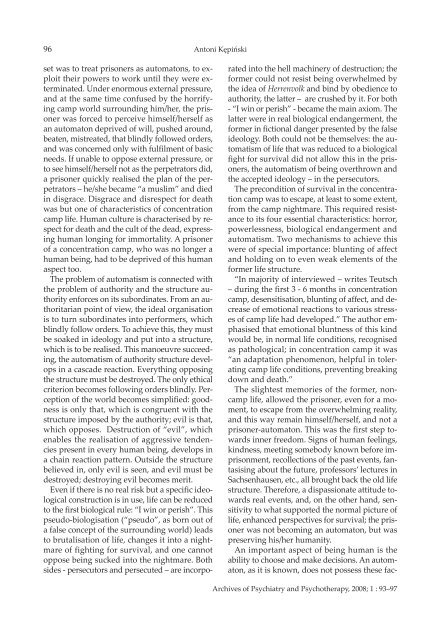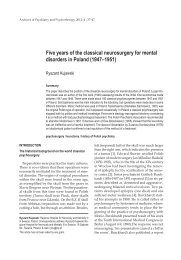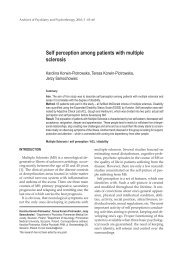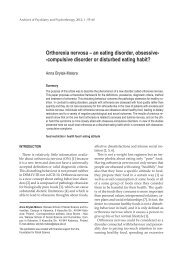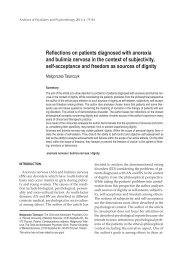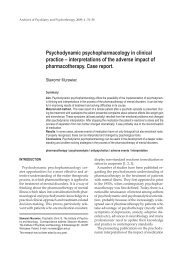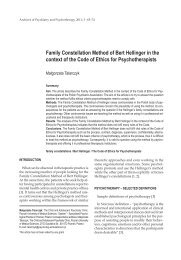93 The Nightmare - Archives of Psychiatry and Psychotherapy ...
93 The Nightmare - Archives of Psychiatry and Psychotherapy ...
93 The Nightmare - Archives of Psychiatry and Psychotherapy ...
Create successful ePaper yourself
Turn your PDF publications into a flip-book with our unique Google optimized e-Paper software.
96 Antoni Kępiński<br />
set was to treat prisoners as automatons, to exploit<br />
their powers to work until they were exterminated.<br />
Under enormous external pressure,<br />
<strong>and</strong> at the same time confused by the horrifying<br />
camp world surrounding him/her, the prisoner<br />
was forced to perceive himself/herself as<br />
an automaton deprived <strong>of</strong> will, pushed around,<br />
beaten, mistreated, that blindly followed orders,<br />
<strong>and</strong> was concerned only with fulfilment <strong>of</strong> basic<br />
needs. If unable to oppose external pressure, or<br />
to see himself/herself not as the perpetrators did,<br />
a prisoner quickly realised the plan <strong>of</strong> the perpetrators<br />
– he/she became “a muslim” <strong>and</strong> died<br />
in disgrace. Disgrace <strong>and</strong> disrespect for death<br />
was but one <strong>of</strong> characteristics <strong>of</strong> concentration<br />
camp life. Human culture is characterised by respect<br />
for death <strong>and</strong> the cult <strong>of</strong> the dead, expressing<br />
human longing for immortality. A prisoner<br />
<strong>of</strong> a concentration camp, who was no longer a<br />
human being, had to be deprived <strong>of</strong> this human<br />
aspect too.<br />
<strong>The</strong> problem <strong>of</strong> automatism is connected with<br />
the problem <strong>of</strong> authority <strong>and</strong> the structure authority<br />
enforces on its subordinates. From an authoritarian<br />
point <strong>of</strong> view, the ideal organisation<br />
is to turn subordinates into performers, which<br />
blindly follow orders. To achieve this, they must<br />
be soaked in ideology <strong>and</strong> put into a structure,<br />
which is to be realised. This manoeuvre succeeding,<br />
the automatism <strong>of</strong> authority structure develops<br />
in a cascade reaction. Everything opposing<br />
the structure must be destroyed. <strong>The</strong> only ethical<br />
criterion becomes following orders blindly. Perception<br />
<strong>of</strong> the world becomes simplified: goodness<br />
is only that, which is congruent with the<br />
structure imposed by the authority; evil is that,<br />
which opposes. Destruction <strong>of</strong> “evil”, which<br />
enables the realisation <strong>of</strong> aggressive tendencies<br />
present in every human being, develops in<br />
a chain reaction pattern. Outside the structure<br />
believed in, only evil is seen, <strong>and</strong> evil must be<br />
destroyed; destroying evil becomes merit.<br />
Even if there is no real risk but a specific ideological<br />
construction is in use, life can be reduced<br />
to the first biological rule: “I win or perish”. This<br />
pseudo-biologisation (“pseudo”, as born out <strong>of</strong><br />
a false concept <strong>of</strong> the surrounding world) leads<br />
to brutalisation <strong>of</strong> life, changes it into a nightmare<br />
<strong>of</strong> fighting for survival, <strong>and</strong> one cannot<br />
oppose being sucked into the nightmare. Both<br />
sides - persecutors <strong>and</strong> persecuted – are incorpo-<br />
rated into the hell machinery <strong>of</strong> destruction; the<br />
former could not resist being overwhelmed by<br />
the idea <strong>of</strong> Herrenvolk <strong>and</strong> bind by obedience to<br />
authority, the latter – are crushed by it. For both<br />
- “I win or perish” - became the main axiom. <strong>The</strong><br />
latter were in real biological endangerment, the<br />
former in fictional danger presented by the false<br />
ideology. Both could not be themselves: the automatism<br />
<strong>of</strong> life that was reduced to a biological<br />
fight for survival did not allow this in the prisoners,<br />
the automatism <strong>of</strong> being overthrown <strong>and</strong><br />
the accepted ideology – in the persecutors.<br />
<strong>The</strong> precondition <strong>of</strong> survival in the concentration<br />
camp was to escape, at least to some extent,<br />
from the camp nightmare. This required resistance<br />
to its four essential characteristics: horror,<br />
powerlessness, biological endangerment <strong>and</strong><br />
automatism. Two mechanisms to achieve this<br />
were <strong>of</strong> special importance: blunting <strong>of</strong> affect<br />
<strong>and</strong> holding on to even weak elements <strong>of</strong> the<br />
former life structure.<br />
“In majority <strong>of</strong> interviewed – writes Teutsch<br />
– during the first 3 - 6 months in concentration<br />
camp, desensitisation, blunting <strong>of</strong> affect, <strong>and</strong> decrease<br />
<strong>of</strong> emotional reactions to various stresses<br />
<strong>of</strong> camp life had developed.” <strong>The</strong> author emphasised<br />
that emotional bluntness <strong>of</strong> this kind<br />
would be, in normal life conditions, recognised<br />
as pathological; in concentration camp it was<br />
“an adaptation phenomenon, helpful in tolerating<br />
camp life conditions, preventing breaking<br />
down <strong>and</strong> death.”<br />
<strong>The</strong> slightest memories <strong>of</strong> the former, noncamp<br />
life, allowed the prisoner, even for a moment,<br />
to escape from the overwhelming reality,<br />
<strong>and</strong> this way remain himself/herself, <strong>and</strong> not a<br />
prisoner-automaton. This was the first step towards<br />
inner freedom. Signs <strong>of</strong> human feelings,<br />
kindness, meeting somebody known before imprisonment,<br />
recollections <strong>of</strong> the past events, fantasising<br />
about the future, pr<strong>of</strong>essors’ lectures in<br />
Sachsenhausen, etc., all brought back the old life<br />
structure. <strong>The</strong>refore, a dispassionate attitude towards<br />
real events, <strong>and</strong>, on the other h<strong>and</strong>, sensitivity<br />
to what supported the normal picture <strong>of</strong><br />
life, enhanced perspectives for survival; the prisoner<br />
was not becoming an automaton, but was<br />
preserving his/her humanity.<br />
An important aspect <strong>of</strong> being human is the<br />
ability to choose <strong>and</strong> make decisions. An automaton,<br />
as it is known, does not possess these fac-<br />
<strong>Archives</strong> <strong>of</strong> <strong>Psychiatry</strong> <strong>and</strong> <strong>Psychotherapy</strong>, 2008; 1 : <strong>93</strong>–97<br />
Księga1<strong>Archives</strong>_08.indb 96 2008-03-04 12:53:53


